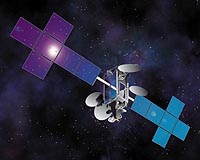 |
Moscow (RIA Novosti) Jul 22, 2009 A Russian carrier rocket has successfully put one military and one civilian satellite into orbit, a spokesman for the Russian Federal Space Agency Roscosmos said. The Cosmos-3M rocket lifted off earlier on Tuesday from the Plesetsk space center in northern Russia. The military satellite is a new addition to a Russian network of about 60-70 military reconnaissance satellites, and a Sterkh series civilian satellite is set to expand Russia's segment of the international COSPAS-SARSAT satellite grouping. The Sterkh-series satellites are designed to replace the Nadezhda series in the International Satellite System for Search and Rescue (COSPAS-SARSAT). Unlike the Nadezhda satellites, the Sterkh series does not provide navigation services, which have been taken over by Russia's GLONASS system. The Cosmos-3M is a liquid-fueled two-stage rocket, first launched in 1967, with over 410 successful launches to date. The booster has been designed to lift a payload of up to 1,500 kg (3,300 lbs) into low, medium, and high orbits. Russia has carried out 17 successful space launches since the beginning of 2009.
Source: RIA Novosti Share This Article With Planet Earth
Related Links Russian Federal Space Agency Launch Pad at Space-Travel.com
 ILS And SES Announce Launch Agreement For QuetzSat-1 Satellite In 2011
ILS And SES Announce Launch Agreement For QuetzSat-1 Satellite In 2011Reston VA (SPX) Jul 15, 2009 ILS International Launch Services (ILS) and SES have announced the execution of an agreement for the launch of QuetzSat-1 on a Proton booster in 2011. QuetzSat-1 is under construction by Space Systems/Loral on behalf of SES Satellite Leasing Limited in the Isle of Man. QuetzSat-1, built by Space Systems/Loral on the flight-proven SS/L 1300 platform, is a high power Ku-band satellite that ... read more |
|
| The content herein, unless otherwise known to be public domain, are Copyright 1995-2009 - SpaceDaily. AFP and UPI Wire Stories are copyright Agence France-Presse and United Press International. ESA Portal Reports are copyright European Space Agency. All NASA sourced material is public domain. Additional copyrights may apply in whole or part to other bona fide parties. Advertising does not imply endorsement,agreement or approval of any opinions, statements or information provided by SpaceDaily on any Web page published or hosted by SpaceDaily. Privacy Statement |